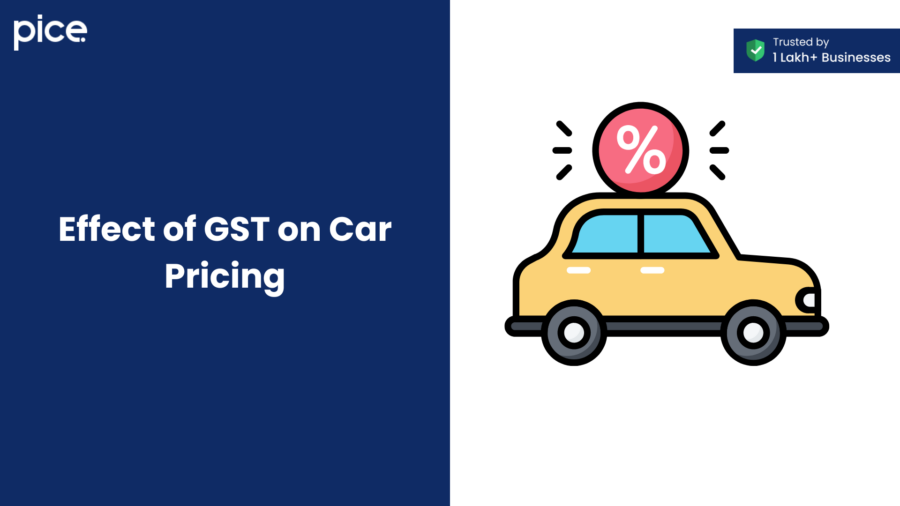Analysing ITC on Commercial Vehicles under GST
- 24 Sep 24
- 9 mins

Analysing ITC on Commercial Vehicles under GST
- Understanding Input Tax Credit (ITC)
- Definition of Motor Vehicles Under GST
- GST Regulations for Commercial Vehicles
- Claiming ITC on Commercial Vehicles
- Eligibility Criteria for ITC on Commercial Vehicles
- Effect of GST on Car Pricing
- GST Rules for Vehicle Rentals and Leases
- Advantages of GST on Commercial Vehicles
- Challenges in Implementing GST for Commercial Vehicles
- The Bottom Line
Key Takeaways
- Input Tax Credit (ITC) allows businesses to offset the tax paid on vehicle purchases and maintenance against output tax payable.
- ITC claims on commercial vehicles are restricted for passenger vehicles with less than 13 seats but have exceptions for specific business uses.
- GST rates on vehicles range from 12% to 28%, depending on the type and use of the vehicle.
- Electric vehicles benefit from a significantly lower GST rate of 5%, down from the pre-GST rate of 20.5%.
- The introduction of GST has reduced tax evasion, streamlined paperwork with e-way bills, and improved logistics for businesses.
Implementing Goods and Services Tax has significantly transformed the indirect tax structure in India. It has now become essential to understand the intricacies of ITC under GST for businesses using commercial vehicles. ITC allows you to offset the tax you pay on input services, including the purchase and maintenance of vehicles against output tax payable.
In this blog, we will discuss ITC and GST input on commercial vehicles to understand the rules and regulations better.
Handle all your sales and purchase invoices in one place.
Pice’s all-in-one invoice management tool helps you track, send, and organize invoices from a single dashboard. Automatically share new invoices with customers, send timely payment reminders, and keep your collections under control—effortlessly.
Want early access? Fill out this form to get request a demo!
Understanding Input Tax Credit (ITC)
Input Tax Credit refers to the Goods and Services Tax (GST) that a taxpayer pays on the purchase of goods and services that will be put to use for the furtherance of business. The taxpayer can reduce the ITC from the GST that he is required to pay on a sale transaction by fulfilling certain conditions.
Definition of Motor Vehicles Under GST
The term 'motor vehicle' does not have a clear definition under the GST law yet. However, according to the Motor Vehicles Act of 1988, a motor vehicle can be defined as “any mechanically propelled vehicle used on roads but does not include a vehicle running on fixed rails or a special vehicle used in a factory or an enclosed premises having less than four wheels with engine capacity not exceeding 25 cubic centimetres.”
It is important to note that as per Notification No.29/2019 dated 31.12.2019 motor vehicle refers only to those vehicles which are designed to carry passengers.
💡If you want to pay your GST with Credit Card, then download Pice Business Payment App. Pice is the one stop app for all paying all your business expenses.
GST Regulations for Commercial Vehicles
Take a look at the table below to understand the GST rates on vehicles:
| Type of Vehicle | Rate of GST |
| Self-loading trailers or self-unloading trailers which have agricultural used | 12% |
| Tractors for semi - trailers (except road tractors) with engine capacity of more than 1800cc | 12% |
| Vehicles for transportation of goods | 28% |
| Motor vehicles with a seating capacity of 10 or more people, including drivers | 28% |
| Motorcycles’s accessories and parts, including sidecars | 28% |
| Mopeds and motorcycles, irrespective of sidecars | 28% |
Claiming ITC on Commercial Vehicles
Section 17(5) of ITC restricts claiming ITC on the purchase of passenger motor vehicles with a provision of seating capacity of less than 13 people (including the driver) and are used for transportation. However, here are a few exceptions:
- ITC is available on the taxable supplies of motor cars where the registered person is a part of the business of these motor vehicles.
- ITC is available on supply of motor vehicle for transport of passengers if the taxable person is a part of this business of transportation.
- Training schools can claim exemption on motor cars used for driving purposes.
Input Tax Credit is available for services like repair on vehicles and maintenance services, motor vehicle insurance and more if the person is a motor vehicle dealer or supplies insurance services concerning such motor vehicles.
Eligibility Criteria for ITC on Commercial Vehicles
These are the eligibility criteria you need to meet for claiming ITC on commercial vehicles:
- Transportation of Goods: You are eligible for Input Tax Credit if you are using a motor vehicle to transport goods. Vehicles like trucks for transportation, tempos, dumpers, JCBs, etc. are included in this.
- Transportation of Persons: If you run a business and acquire a car for transportation of employees or transportation of passengers having a seating capacity of 13 or more (including driver), you can claim ITC.
Effect of GST on Car Pricing

Here is a table for you to better understand the Goods and Services Tax rate on car pricing:
| SL. No. | Car Segment | Capacity of Engine | Tax Rate (Pre-GST) | GST Rate (Post-GST) | Difference |
| 1. | Small vehicles | Lesser than 1200cc | 28% | 18% | 10% |
| 2. | Mid-size vehicles | Range between 1200cc and 1500cc | 39% | 18% | 21% |
| 3. | Luxury cars | More than 1500cc | 42% | 28% | 14% |
| 4. | SUV | Greater than 1500cc | 45% | 28% | 17% |
| 5. | Electric vehicles | NA | 20.5% | 5% | 15.5% |
The applicable GST rate on small cars like Maruti Suzuki Swift, Tata Tiago, etc. is 18%. Before GST implementation, the applicable tax rate was 28%.
Mid-size vehicles like Tata Nexon, Maruti Baleno, etc. attract a much lower tax rate of 18% as compared to 39%.
Luxury cars like Land Rover, Lamborghini, etc. attract a tax rate of 28% instead of 42% which was applicable in the earlier tax regime.
Tax rates on SUVs like Jeep Compass, Renault Duster, etc. have decreased to 28% from 45%.
Before GST implementation, the tax rate on electric vehicles was 20.5%. Under GST, the total tax applicable on electric cars is 5%.
Let us look at this table to understand the cess which is applicable in addition to GST on cars:
| Sl. No. | Car Segment | Capacity of Engine | GST Rate | Cess |
| 1. | Small vehicles | Lesser than 1200cc | 18% | 1% |
| 2. | Mid-sized cars | Range between 1200cc and 1500cc | 18% | 3% |
| 3. | Large vehicles | Greater than 1500cc | 28% | 20%-22% |
GST Rules for Vehicle Rentals and Leases
There are two rates of GST which are applicable in renting vehicles:
- With full Input Tax Credit: 12%
- With Limited Input Tax Credit: 5%
The reverse charge mechanism applies to renting motor vehicles which are passenger transport vehicles, provided the supplier meets these conditions:
- The supplier is the provider of these services to a body corporate.
- The supplies are anyone except for the body corporate.
- The supplier does not levy a GST of 12% on the invoice from the recipient of the service.
Advantages of GST on Commercial Vehicles
Here are a few advantages of the applicability of GST on commercial vehicles:
- Decrease in Tax Evasion: GST implementation has made it challenging for businesses to evade taxes and use unfair means. Moreover, under GST, the Government can keep better track of the transfer of goods and services.
- Less Paperwork: The physical bill has been replaced by an e-way bill. Under GST, there is less requirement for paperwork as most can be done digitally.
- Better Logistics: Under GST, there has been a considerable improvement in logistics. It has also made the inter-state supply of goods and services easier.
Challenges in Implementing GST for Commercial Vehicles
These are the challenges in implementing Goods and Services Tax for commercial vehicles:
- Higher Cost of Compliance: Under GST, there are many compliance requirements such as filing returns, collection and depositing of GST and more. Thus, the compliance cost is also high.
- Complexities of GST Laws: The laws of GST can be complex for some. For instance, small business owners may find it challenging to understand and comply with GST laws.
The Bottom Line
It is crucial to understand the GST input on commercial vehicles for both businesses and individual taxpayers. By understanding the eligibility to claim Input Tax Credit, you can not only optimise tax savings but also decrease tax burden.
 By
By 
















